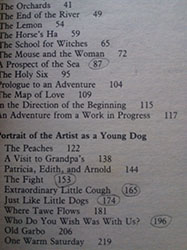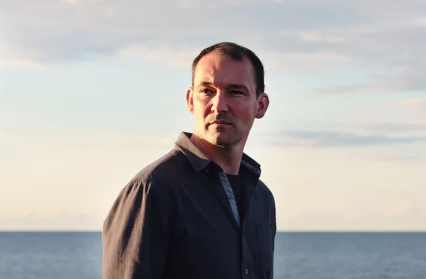Cynan Jones delves into his past and introduces us to his favourite short stories, explaining his struggle since childhood to find a form so transformative.
When I was fifteen, my father gave me a copy of The Collected Stories of Dylan Thomas. In the contents, he’d ringed the stories he suggested I start with.

I think it was the first real writing for adults I read and understood. I’d devoured Cussler, Forsyth, Dennis Wheatley, Ludlum. I’d gone toe-to-toe with the great adventure novels, Conan Doyle, Rider Haggard; traipsed (albeit mostly wide-eyed) through Tolkien.
But then, in short little bursts, came stories I understood on a fundamental level. Of children playing. Of playground fights.
I remember the feeling of reading those stories, and I’ve recently felt it again. The feeling – in a relatively small space of time – of receiving something complete and total and transporting.
But then, chasing that thrill, I read more widely. And I came up against a lot of not-very-good writing. Or very obvious, pedestrian writing.
I think I started to align the label ‘short story’ with the weak stuff that too frequently makes it into magazines, periodicals and anthologies. Suddenly, ‘short stories’ left me disappointed and I took to avoiding them.
After a while, I stopped reading them altogether unless they were written by the unimpeachably brilliant. Kafka, Joyce, Bradbury, Hemingway, Carver, Borges, Dahl and so on.
It was my fault entirely, but during my twenties and early thirties, only a few collections blew me away: Among them Steinbeck’s The Long Valley, Wells Tower’s Everything Ravaged, Everything Burned, and James Salter’s Last Night. And more recently, Ted Hughes’ Difficulties of a Bridegroom, from which I still haven’t recovered.
When a story of mine landed on the Sunday Times EFG longlist earlier this year, I made the effort to get some short stories under my belt in the event I would have to talk about them.
So in a short space of time, I read a stack, starting with Kevin Barry’s Dark Lies the Island. From the first story I was back there, fifteen, thrilled at the possibilities of the form.
The brilliantly technical, careful stories in Tom Lee’s Greenfly. Lucy Wood’s fairytale Diving Belles. Claire Keegan’s faultless Foster – a ‘long short story’ – and her collection Antarctica. (How could you not be thrilled at a collection that contains the line ‘I drank Fred West’s milk while my sister was fucking the postman’?).
Contrast the droll, passive behavioural satire in Will Self’s The Quantity Theory of Insanity with the physical society of Chris Offutt’s Out of the Woods, the echoing landscape of Claire Vaye Watkins’ Battleborn, particularly in her story ‘Man-o-War’. The growing substrate of unnerve building through Jon McGregor’s This Isn’t the Sort of Thing That Happens to Someone Like You.
As I wrote recently for the Western Mail, the short form sets a challenge: to tell a story without the safety net of background, setting, conjecture, history. To imply rather than explain. To give the reader just enough to fire their own instinct to understand the World. When that goes right, a short story can stay with the reader as a complete event in a way only the rarest novels can.
A story is about what it leaves behind. Given that, there’s no reason a short story should be a smaller story.
I think this weekend – if it rains, as they say it will – I might find myself somewhere quiet, and read that Dylan Thomas collection again.
Photograph by Cynan Jones
More of Wales Arts Reviews’ features on Cynan Jones can be found here.












